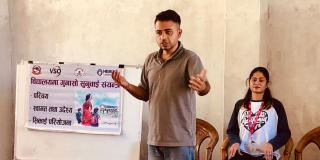
Meet Dev Upadhyaya, a volunteer Learning Advisor working on an inclusive four-year education project targeting 60 schools in Nepal.
The SIKAI project aims to address socio-cultural and political barriers faced by marginalised girls and boys in grades 5 and 6 to access primary education and help them successfully transition from childhood to adolescence.
Here, Dev talks about how volunteering impacted the community and him and why he thinks the volunteering for development approach works.
About Dev
"I'm Dev Upadhyaya, a Nepali born in Kathmandu. My early life was urban, but I had the unique experience of traveling to Africa with my father, who worked for the UN, at the age of six.
This introduced me to different cultures and people, and I quickly learned that people worldwide are more alike than different. I think this was the first time where I felt like meeting new people was an exciting experience, and I didn’t have a fear of going to new places or engaging with people.
I was small, but attended the school, met new friends, people of different religion and racial backgrounds.
After finishing school, I continued my education in India, earning bachelor's and master's degrees in business management with a finance specialisation. However my corporate career left me unsatisfied due to its cut-throat culture focused solely on profit.
In 2017, I found my passion for volunteering when I worked on VSO's International Citizen Service (ICS) program as a Team Leader, overseeing a group of 24 volunteers working on education activities.
This experience ignited my interest in community development and working in the field. I'm someone who really enjoys working in the field rather than in office setting from nine to five.
There is something special about going to the field, getting your hands dirty, meeting people and making the difference in the community. In 2021, I also worked as a research assistant, concentrating on technical education for those who had dropped out of grades eight, nine, or ten. I engaged in research work, freelancing, and joined the British Council in 2022, where I conducted exams."
How did you discover VSO?
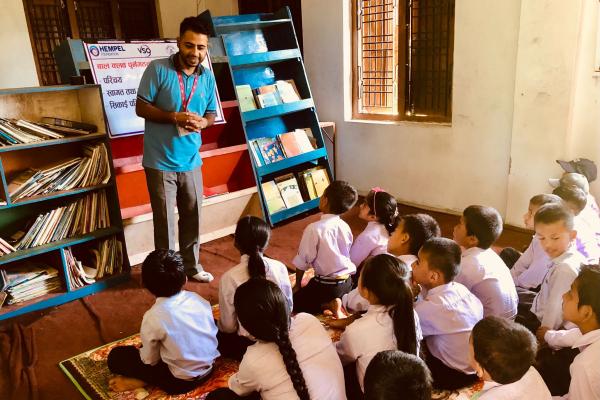
"I found out about the VSO opportunity while looking for jobs and volunteer positions on the VSO website. I had been subscribed to the VSO newsletter, which showcased various volunteering efforts, and this played a part in sparking my interest. Reading stories from volunteers who had taken part in similar placements was very motivating."
What is the project you're working on?
"The SIKAI project is an inclusive education initiative funded by the Hempel Foundation in Denmark, focusing on children in grades one to five in Nepal's primary school system.
The project ensures that children from diverse backgrounds attend school regularly and prevents school dropouts by support children's educational journey up to at least secondary levels.
SIKAI also places a strong emphasis on improving children's numeracy and literacy skills, recognising the foundational role these skills play in shaping their future.
The project operates in the hilly and remote Baglung district and covers two municipalities. I work as a Volunteer Learning Advisor in one of the municipalities, overseeing 33 schools.
My responsibilities include program implementation, planning and support, conducting educational sessions for various stakeholders, capacity development for local teaching staff and motivating and encouraging the community volunteers.
I also coordinate with the VSO Nepal office, local partner organisations, and municipal and educational officials, in addition to contributing to reporting, data collection, and impact measurement."
What have you found most challenging as a volunteer?
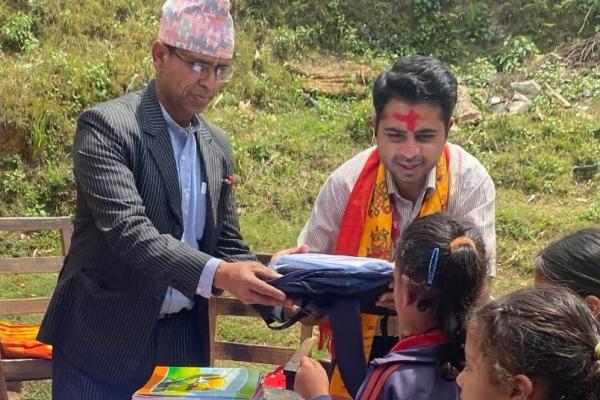
"The main challenge is engaging parents in their children's education. Some parents believe that sending their kids to school is enough, and it can be difficult to convince them of the importance of education, especially when facing traditional beliefs or practices that have been in place for generations.
We conduct parental awareness sessions on harmful traditional practices, which can be a delicate topic to address, particularly if parents themselves were married at a young age. The biggest change I saw on the project was the parents. Some parents wouldn't go to school regularly in the past, whereas now they come often.
We've also seen a significant improvement in school attendance, particularly among the children who had been out of school for two years due to the COVID-19 pandemic. Convincing parents to send their children to school, despite the economic contributions their kids make to the family, was a major accomplishment.
Another big impact we’ve had is establishing a complaint response mechanism in schools, with committees and complaint boxes to allow children to voice their concerns. The complaint system has made schools more child-friendly and it has changed teacher behaviour and made students feel more comfortable asking questions, without fear of punishment.
The other difficult aspect is the schools that we go to are public schools that aren’t funded very well. Providing school supplies can be a huge burden on parents so we also provide uniforms, bags, and stationery to children from marginalised communities.
This may seem like a small contributions but it helps to remove barriers to education.
We also fund children's club activities. The school is now not only about learning and studying, but also about helping children express themselves in whatever they want to do."
How did you change community attitudes towards education?
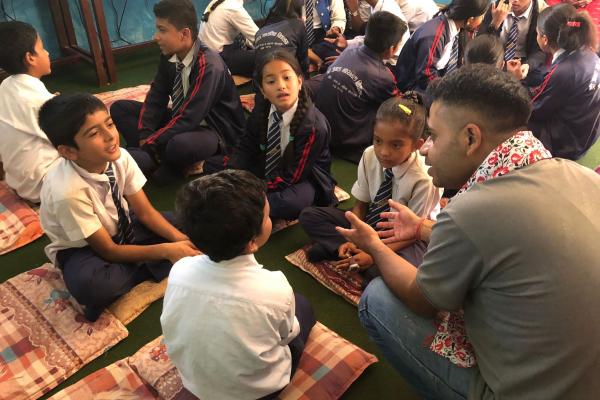
"When we started conducting the learning sessions in schools, we struggled to attract many parents. The community had its reservations, and were hesitant to express themselves. However, by consistently holding these sessions, we built relationships with them and parents gradually began sharing with us their challenges at home and in schools.
Many of the parents previously didn’t know if their children were even attending school once they left the house. So just to have these parents - who previously had little involvement in their children's education - begin coming to school, interacting with us and other parents and teachers, was itself a very big thing.
In classrooms with an average of 15 to 20 students we successfully brought five children back to school in each class."
What impacted you most working on the project?
"I think it’s the children that had the biggest impact on me. Despite sometimes having to do long hikes to remote areas where we work, the children's enthusiasm and joy upon our arrival has been incredibly motivating. They would eagerly participate in our sessions, and seeing them happy to have us there, was a powerful motivator.
In one particular case, there was a child who used to have disciplinary issues, often being abusive to teachers and peers due to what he learned from his community and family. He had been attending school irregularly and his family were not supportive of his education.
Over time, this child has come on in leaps and bounds. He no longer engages in abusive behaviour, has become a regular school attendee and improved his overall conduct. That is just one case of many that moves and inspires you in this work.
Quantifying outcomes after 11 months can be challenging, but seeing the visible changes in people's attitudes and behaviours, especially when you interact with them in the field, is something that can't be translated into numbers."
What makes VSO's approach to development unique?
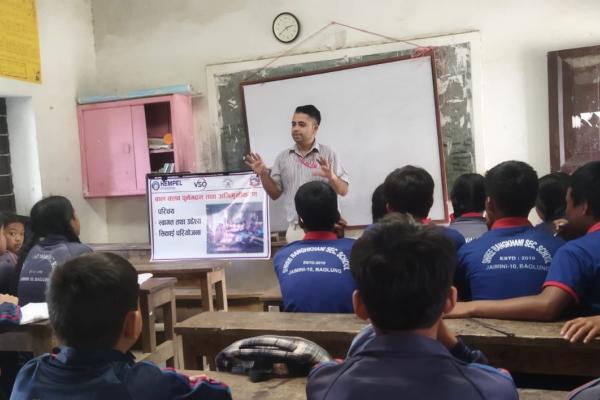
"One of the best things about working for VSO is that it is for volunteers and this emphasis on volunteerism is a unique feature.
National volunteers generally have a lot of local context information and knowledge. With an international volunteer coming in, we can learn what practices and activities are being implemented globally. It has been helpful just bouncing ideas off the international volunteers, getting their perspective.
Having an international volunteer working with a national volunteer in a local context, helps. It is more efficient than an international volunteer working remotely alone."
How do you think you've changed personally and professionally?
"Personally, and professionally, this experience has made me realise the privileged background I come from. It's taught me the value of doing things for others and finding happiness in selfless actions, even if they don't bring immediate financial rewards.
Professionally, VSO has provided me with a welcoming and supportive platform to transition into a career in the development field. While I initially had trepidations about my capabilities, the organisation's global support network and the guidance from my colleagues and fellow volunteers have been invaluable in my professional growth."
What advise would you give to someone considering volunteering with VSO?
"I think volunteering itself is never about money. It's an endeavour that offers its own rewards. When you volunteer, you give back to the community you work with, and this interaction can shape not only the community but also your own growth.
Regardless of your background, you can make a significant impact through volunteering. The smallest actions in a community can lead to substantial changes in people’s lives, and that in itself is a rewarding experience. It's all about voluntary work and making a difference in the community."
How do you think VSO volunteers make an impact?
"Having volunteers out in the field makes a big difference. The thing that volunteers do, is we change lives. That's all we do, we change lives, and it might be that the life of a child, the life of a parent, the life of a teacher and how they change in the community. We change things."
Learn more about how SIKAI is empowering inclusive education.
Read more

The two volunteers empowering girls and young women in Mozambique
Nelma and Carmirene and are two volunteers working on VSO's EAGLE project in Mozambique. For Nelma and Carmirene, education is not just about school, it is about meeting people where they are and using the right tools to challenging harmful norms. Here are their stories.
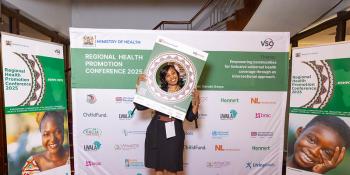
In photos: Our Regional Health Promotion Conference 2025
Check out some of our favourite photos from Regional Health Promotion Conference (RHPC25). This event sought to reimagine Universal Health Coverage through the lens of intersectionality.
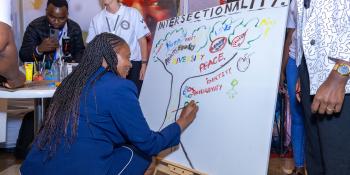
Using intersectionality to create healthy beginnings and hopeful futures
World Health Day brings global attention to the urgent need to end preventable maternal and newborn deaths. Learn more about how our Regional Health Promotion Conference is tackling these issues head on.
